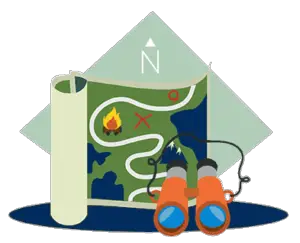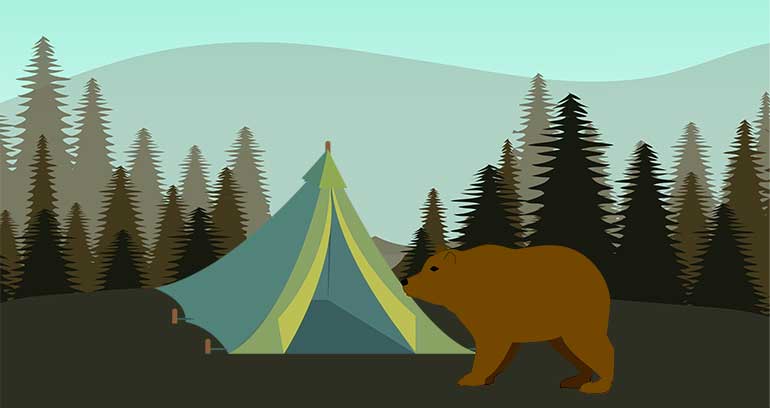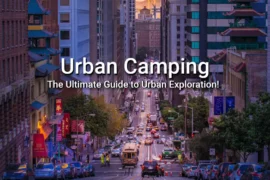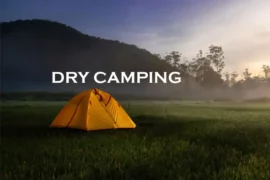Knowing the right camping safety tips will ensure that, you have a worry-free outdoor camping experience. Generally, overnight stays in a tent or a recreational vehicle, with or without a shelter, are what we mean when we say “camping.” Camping with your family may be a wonderful opportunity to spend fun together. It is far more enjoyable to work as a group while erecting tents, preparing meals, and playing games.
However, many considerations must be made to ensure your camping safety tips while having a good time. Here are some great tips for you to have a good time camping while remaining prepared for whatever comes your way.
1 .Take time to research your destination.

When it comes to camping safety tips, there is one very important thing that you need to know. Unless you first study where you plan to go camping, it might be difficult to determine what you need to carry.
Are you planning to camp near the ocean? Or are you going to be in the desert? The stuff you’ll need to be safe in a desert environment is somewhat different from what you’ll need in the forest. So first, before you go, you should research where you’re going. The goal is to be prepared for anyone or anything that could ruin your good time.
2. Check at the forecast.

Another camping safety tip is maintaining an eye on the weather forecast and packing properly. It is important to note that bright sunny days can quickly transition into icy chilly nights if the temperatures are not properly balanced between the two.
During the day, you may require sunglasses, hats, and sunscreen; at night, you may require thick socks, tracksuit bottoms, and a warm sweater. In advance, be aware that rain may occur. If you want to avoid this, you can check a few sites for forecasts.
3. Keep an eye out for any dangers near your tent.
You should consider your age, physical limits, and medical requirements, as well as those of everyone else in your group while reserving the right sort of shelter and campsite space. Then you should take a look around and analyze the potential dangers in your immediate area.
Keep a safe distance from huge gum trees when camping. Some species are prone to shedding huge branches at any moment. You should consider putting up your campsite away from potential hazards such as rivers, streams, and steep drop-offs if you are camping with children. Here’s how to make tent camping comfortable.
4. Always keep basic first aid items available.
It is critical to have a first aid kit on hand. Having a good first aid kit will not only assist you in dealing with injuries that are prevalent when camping but will also prepare you for any survival circumstances that may happen during your trip.
Learn about basic first aid instructions here.
5. You should carefully package and store food.
You increase your chances of attracting animals by leaving food out on picnic tables or anywhere else that isn’t secure. You can prevent uncomfortable encounters with animals by storing your food in airtight, watertight containers and keeping them in an insulated cooler. To avoid contracting foodborne diseases, always wash your hands and keep raw and cooked foods separate.
6. You should be prepared for encounters with wild animals.

You may keep your food in your car or food container to avoid becoming an undesirable animal attraction. Make sure to stay away from wild animals and avoid feeding them. If you are camping or trekking near a bear, a snake, or an alligator’s territory, do not look them up.
You can see wild animals appear to be friendly, but if they feel threatened, they may charge at you and do serious injury. Keep in mind that you should avoid getting too close to their babies, as they will always be violent in protecting them.
7. You should protect against poisons.
Keep your hands away from any plants that you don’t know. If the skin on any area of your body that has come into touch with a toxic plant should be cleansed with cold water immediately to remove the oil causing your allergic response. If you want to have a safe camping trip, you can bring calamine lotion or hydrocortisone cream. It may help relieve the itching associated with poison ivy.
8. Be fire safe around campfires.

This camping safety tip is very important. Never create a fire beneath low-hanging branches or leave a blazing fire unattended. You should clean up any trash that may have accumulated surrounding the fire pit, such as garbage or dried leaves and grass.
For more safety, you can surround the fire area with rocks. Keep explosives such as aerosols, gas bottles, and fuel cans at least 3 meters away from your tent to avoid fire. The basic thing is to keep an eye on the kids and teach them how to be safe around flames and never poke or toss objects into a fire.
Now that you are aware of these camping safety tips, remember to stay safe, have fun, and take pleasure in the great outdoors on your next camping trip!
If you are interested click here to read about camping in the rain.




